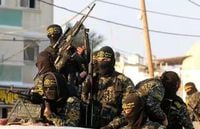Israel's ongoing military operations in Gaza have escalated dramatically, resulting in devastating humanitarian consequences and raising international concerns over potential war crimes. As the conflict intensifies, the Israeli government has announced plans for a full takeover of Gaza, prompting fears of further destruction and displacement among the Palestinian population.
Recent airstrikes in the Bureij refugee camp, which housed internally displaced persons, resulted in the deaths of 31 individuals, including many civilians. According to Gaza's Civil Defense, the first strike on Tuesday night killed 22 people, followed by another strike that claimed nine more lives just hours later. Since October 2023, Israeli operations have reportedly caused at least 52,615 deaths, predominantly among civilians, according to the Gaza Health Ministry.
The humanitarian situation in Gaza has deteriorated sharply, exacerbated by an Israeli blockade that has prevented humanitarian aid from entering the region since March 2, 2025. The United Nations has accused Israel of using the humanitarian crisis as a "weapon of war," noting that the lack of food, water, and medical supplies has led to conditions of starvation and despair.
Israeli military officials have warned that if Hamas does not agree to a ceasefire by the end of U.S. President Donald Trump's upcoming Middle East tour from May 13 to 16, they will proceed with a large-scale military operation aimed at completely conquering Gaza and displacing its population. Thousands of reservists have been called up to reinforce the Israeli army, indicating the seriousness of this intent.
In a stark statement, Israeli Finance Minister Bezalel Smotrich declared that Gaza would face "total destruction," suggesting that the population could be forcibly relocated southward or to third countries. This sentiment was echoed by Israeli Minister of Heritage Amichai Eliyahu, who stated, "There is no problem bombing Hamas's fuel and food supplies. They must starve. If there are civilians fearing for their lives, they should implement the migration plan." Such comments have drawn sharp criticism and concern from international observers.
As the situation escalates, diplomatic efforts continue. Qatar, acting as a mediator, has announced its commitment to pushing for a new ceasefire. Trump, during his Middle East visit, is expected to make significant announcements regarding the region, although details remain sparse. An Israeli official mentioned that a "window" for negotiations regarding the release of hostages could open by the end of Trump's tour, as President Isaac Herzog has called for additional efforts to secure their return amid ongoing violence.
Despite the grim outlook, there are indications that the Israeli government is also considering the implications of its military strategy. An Israeli official indicated that a thorough investigation is underway concerning allegations of hindering humanitarian aid during Trump's term, emphasizing the need for immediate assistance to civilians in Gaza.
The political landscape is further complicated by regional dynamics. Lebanon is reportedly pushing Palestinian President Mahmoud Abbas to visit Beirut and urge Palestinians there to disarm in an effort to stabilize the situation and pressure Hezbollah to do the same. Meanwhile, the transitional government in Syria is reportedly cracking down on Palestinian militant groups, particularly Islamic Jihad, as it seeks to eliminate extremist elements within its borders.
The escalation of violence in Gaza raises profound questions about the future of Israeli-Palestinian relations and the broader Middle East. The potential for a humanitarian disaster looms large, with international calls for accountability growing louder. As the world watches, the actions taken by both Israel and Hamas will significantly shape the region's future.
In light of these developments, the international community remains on high alert. The UN has indicated that it may classify Israel's actions as war crimes if the attacks on civilians and infrastructure continue unabated. The urgency of the situation demands a concerted effort to address the humanitarian crisis and restore peace in the region.
As tensions rise, the role of external powers, particularly the United States, will be critical. Trump's visit to Saudi Arabia, Qatar, and the UAE is seen as a pivotal moment that could influence the trajectory of the conflict. Observers are keenly aware that the stakes are high, and the potential for escalation is significant.
Ultimately, the resolution of the conflict hinges on the ability of all parties involved to engage in meaningful dialogue and seek a peaceful resolution. The ongoing violence has already inflicted severe tolls on innocent lives, and the need for a sustainable solution has never been more urgent.




